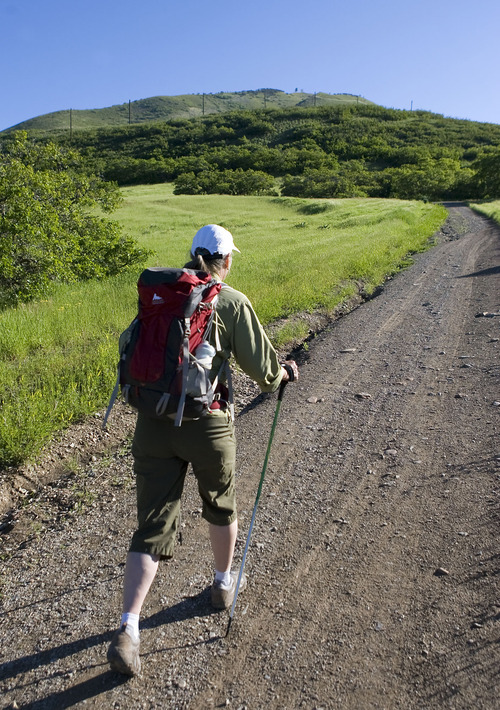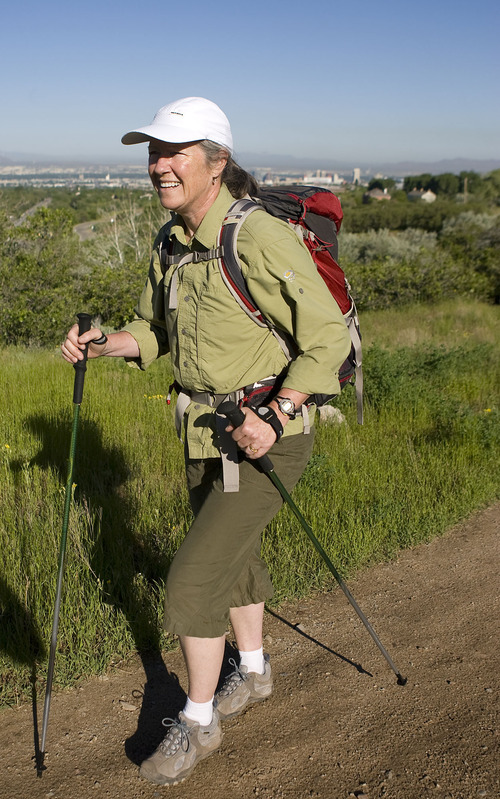This is an archived article that was published on sltrib.com in 2011, and information in the article may be outdated. It is provided only for personal research purposes and may not be reprinted.
Michele Straube had labored her way to the top of a 15,000-foot pass in Peru two years ago — exhausted, breathless and dizzy as usual, from the heart condition that had eaten away at her active lifestyle— when she had the epiphany that even now makes her want to cry.
"It was a wonderful experience," she recalled of the family hiking trip. "But at that pass, I just finally said, if I can't figure out something to do about this, this is the last one of these hikes I'm going to be able to do."
Yet the 56-year-old Salt Lake City resident is embarking this week on the first leg of a multi-year hiking adventure along the soaring peaks of the Via Alpina trail in Europe. An innovative procedure at the University of Utah's Comprehensive Arrhythmia Research & Management Center has cured the atrial fibrillation she lived with for 30 years.
"It's a miracle, for me," she says.
For many others, too.
Straube was one of the estimated 6 million people in the United States with atrial fibrillation — AFib, for short — a heart-rhythm disorder that often leads to extreme fatigue, dizziness and palpitations that can make simple tasks difficult. Its cause is unknown, and doctors say those who have it are five times more likely than others to suffer a stroke.
"It's the cancer of arrhythmias, or heart diseases," Dr. Nassir Marrouche says.
Marrouche is the man who pioneered a new way of treating AFib. Rather than treating all AFib patients the same way — with medication — Marrouche uses magnetic-resonance imaging tests to individually assess a heart's condition and determine which patients are the best candidates for a refined treatment plan.
"Look before you treat," he said, noting that about 60 percent of AFib patients are good candidates for the new treatment.
For those such as Straube whose hearts show the proper characteristics, Marrouche performs a procedure called an ablation. A catheter is used to effectively scar diseased tissue in the heart. It is done in such a way that it blocks abnormal electrical impulses and directs normal ones to the proper pathways.
The result is a regular heartbeat, and a regular life.
"All of a sudden, I can do all kinds of stuff I couldn't do before," Straube says.
Ride a bicycle, for example.
Straube had given that up years ago, because even a simple ride down the street drove her to the edge of unconsciousness. Running wasn't happening, either, and stairs became a problem.
Even when she took easy walks with friends, Straube strategically asked questions at the bottom of hills, so her friends could answer while she huffed and puffed and steadied her way up.
"It had always been that way," she says, "and that got worse over time, and the mountains that I could climb got smaller and smaller."
Not anymore.
Marrouche performed an ablation on Straube about 18 months ago. Since then she has been reclaiming the active life she had gradually lost during all those years when doctors told her there wasn't much they could do beyond medication.
She and her husband, Bob Adler, plan to hike a 220-mile leg of the Via Alpina this summer, then return each summer to hike another portion of the trail network between Monaco and Trieste, Italy— near the border with Croatia and Slovenia.
Meanwhile, Straube aspires to raise awareness about AFib and the new treatment.
A former environmental attorney who's now a mediator, she's particularly concerned about the estimated 30 percent of those who have AFib and don't realize it — yet live with that drastically increased chance of having a stroke.
"It's a risk," she says, "a lot of people don't even know they are at risk, and if you do have it, there's much more that can be done than maybe you know."
On her way up another mountain, Straube is living proof of that.
Hiking from the heart
Video • Watch Dr. Nassir Marrouche discuss his treatment: bit.ly/kKbIm8
Online • Comprehensive Arrhythmia Research & Management Center: healthsciences.utah.edu/carma/
Follow • See the Via Alpina, where Salt Lake City's Michele Straube plans to hike: via-alpina.org





